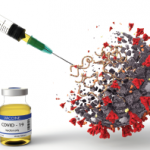Another study outlined in the presentation focused on the use of the flu vaccinations in RA patients who had used rituximab four to eight weeks previously (11 patients who were considered the early group) or six to 10 months before (12 patients who were considered the late subgroup), 20 patients who were using methotrexate, and 29 healthy controls.2 Investigators measured the levels of antibodies against the three vaccine strains before and 28 days after vaccination. The investigators found that rituximab reduced humoral responses in RA patients, although there was a slightly better response six to 10 months after rituximab was used.
Dr. Bingham’s presentation reviewed studies regarding vaccines and their efficacy with medications such as methotrexate, hydroxychloroquine, abatacept, and others, noting that there is only scant information regarding vaccines and some of these drugs. He also cautioned that one common problem with vaccination studies is that there is rarely a control group for comparison. Additionally, “the primary endpoints may be very different, immunizations and assays used may vary, and prior exposures may also introduce variability,” he said.
Staying Up to Date
Rheumatologists and health professionals can stay up to date on vaccination guidelines, which are revised each year, on the CDC website, www.cdc.gov/vaccines/pubs/vis/default.htm. Although there is not a specific category on these guidelines for autoimmune patients, physicians might find it helpful to look at guidelines for immunocompromised patients and patients with chronic diseases such as diabetes. Rheumatologists can also find more vaccine information on the Vaccine Adverse Event Reporting System at www.vaers.hhs.gov.
Dr. Bingham concluded by sharing the recommendations published in Vaccine.3 The investigators, who took part in a Delphi process, recommend that a three- to six-month delay take place between the end of drug-related immune deficiency and the administering of live virus vaccines. They also noted that there is no contraindication in administering live virus in patients who are receiving systemic corticosteroids for less than two weeks or at a daily dose that does not exceed 10 mg of prednisone if the latter is long-term treatment.
Dr. Bingham recommended that rheumatologists and their staff include a careful immunization history and documentation as part of patient information and that communication take place with the patient and primary care provider regarding immunizations. He also recommended immunizing before immunosuppression therapy when possible and conducting ongoing reassessment of this issue.
Vanessa Caceres is a medical writer in Bradenton, Florida.
References
- Bingham CO 3rd, Looney RJ, Deodhar A, et al. Immunization responses in rheumatoid arthritis patients treated with rituximab: Results from a controlled clinical trial. Arthritis Rheum. 2010;62:64-74.
- van Assen S, Holvast A, Benne CA. Humoral responses after influenza vaccination are severely reduced in patients with rheumatoid arthritis treated with rituximab. Arthritis Rheum. 2010. 62:75-81.
- Duchet-Niedziolka P, Launay O, Coutsinos Z, et al. Vaccination in adults with auto-immune disease and/or drug related immune deficiency: Results of the GEVACCIM Delphi survey. Vaccine. 2009;27:1523-1529.



